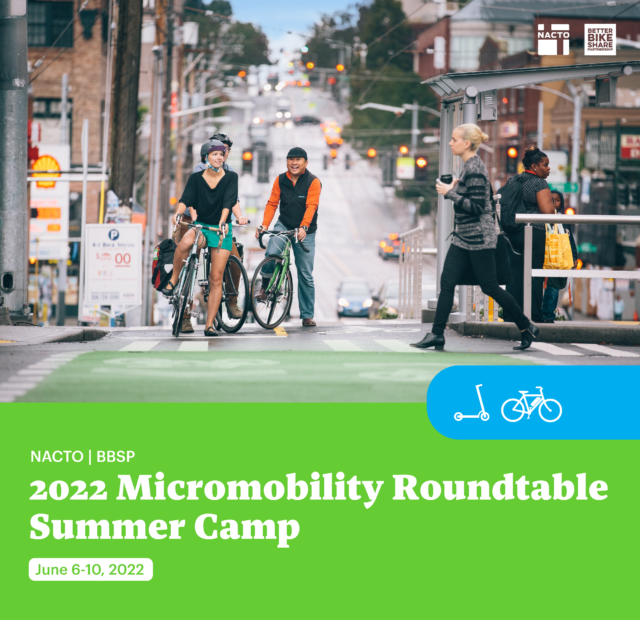The shared micromobility landscape has changed significantly in the last five years.
Operators are dissolving, consolidating and reorganizing, while cities are taking more proactive approaches to managing and regulating their programs.
NACTO, in partnership with Better Bike Share Partnership, is launching our third virtual roundtable: the 2022 Micromobility Summer Camp. The format will be a NACTO camp or “unconference” where conversations are proposed, programmed, and led by attendees. It’s a chance to create space where we can be hands-on, flexible, candid, and of course, have fun!
City practitioners will have the opportunity to listen to presentations and have open conversations with peers across North America in an informal setting.
Denver’s Shared Micromobility Journey: From Legacy to License
Monday, June 6, 2pm – 3pm ET / 11am – 12pm PT
Learn how the loss of Denver’s legacy docked bikeshare system spurred a shared micromobility licensed program and ridership boom.
Led by Stephen Rijo (Principal City Planner | City and County of Denver Dept. of Transportation & Infrastructure) moderated by Anthony Rios-Gurrola (Micromobility Planner | Street Transportation Department, City of Phoenix).
Format: Presentations with Q+A.
A link to the presentation can be found here.
The Future of Regulating (For-Profit) Micromobility
Tuesday, June 7, 2pm – 3pm ET / 11am – 12pm PT
It’s been five years since cities began regulating dockless shared micromobility. How can cities continue to shape programs to fit their needs? Join a discussion of how permits, RFPs, and partnerships can address equity goals and other gaps in for-profit models for dockless and station-based shared micromobility.
Led by Meg Young (New Mobility Manager | Baltimore City Department of Transportation)
Format: Open conversation. Cities only.
A link to the presentation can be found here.
Corralling Dockless Shared Micromobility in Grand Rapids, MI
Wednesday, June 8, 2pm – 3pm ET / 11am – 12pm PT
To address concerns about vehicle clutter and barriers to safe/accessible pedestrian passage, City of Grand Rapids developed an extensive network of designated parking zones for the Shared Micromobility pilot, installing more than 200 designated parking areas in a very short amount of time. What’s worked, what hasn’t or could work better, where are we headed.
Led by Kristin Bennett, AICP (Transportation Engineering Projects Manager | Traffic Safety Division, City of Grand Rapids, MI).
Format: Presentations with Q+A.
A link to the presentation can be found here.
Flexibility as a Tenet of Bikeshare System Design
Thursday, June 9, 2pm – 3pm ET / 11am – 12pm PT
In this session, we’ll address various challenges in overseeing bikeshare programs, and examine how we can move away from a vertically-integrated model to something more flexible. How do we design to incorporate market competition? What parts should be public? Which should be private? How do e-bikes fit in? What are geographical considerations for system growth/finance? What kind of public funding should we be steering towards?
Co-led by Adrian Leung (Transportation Planner | Livable Streets, SFMTA), Kim Foltz (Transportation Planner | Boston Transportation Department), and Waffiyyah Murray (Indego Program Manager | City of Philadelphia).
Format: Open conversation. Cities only.
A link to the presentation can be found here.
Regulating Bikeshare with and as Public Transit: Stories from Austin & Boston
Friday, June 10, 2pm – 3pm ET / 11am – 12pm PT
AUSTIN – E-Bikes & Transit: A Match Made in Austin. In 2020, the City of Austin and Capital Metro Transportation Authority entered into an Interlocal Agreement (ILA) to form a partnership for the planning, financing, marketing and deployment of the City’s shared, docked bicycle program, MetroBike, in order to better integrate the program with transit as a first/last mile solution. MetroBike is making long term bikeshare service improvements, including providing an all-electric fleet, expanding the number of bikes and stations, integrating with existing and planned Capital Metro transit services, and improving services and reaching communities outside the downtown core.
BOSTON – Framing Bikeshare as Public Transit. What’s the role of bike share in a city’s obligation to provide mobility options to its residents, workers and visitors? When bike share is framed as public transportation it helps both city leaders and the public understand it to be an essential service rather than a frivolous amenity. But public transportation comes with obligations – ensuring equity in access, providing fair and affordable pricing, protecting data privacy, and exercising transparency in decision making. We’ll share how the framing of bike share as public transportation has helped the City of Boston’s set (and achieve!) ambitious goals for system expansion, win over potential detractors, and establish strong requirements around equity, pricing, and data access with our operator.
Led by Eliza Yu (Associate Project Manager | Transportation Demand Management, City of Austin), Nadia Barrera-Ramirez (Manager| Cross-Agency Transit and Mobility Programs, Capital Metro), and Kim Foltz (Transportation Planner | Boston Transportation Department).
Format: Presentations with Q+A.
A link to the Austin presentation can be found here.
A link to the Boston presentation can be found here.
Invitations will be limited. Staff at NACTO member cities will be invited directly. Any interested non-profit operators or members of community based organizations working on shared micromobility should email Cary Bearn ([email protected]) for an invitation.